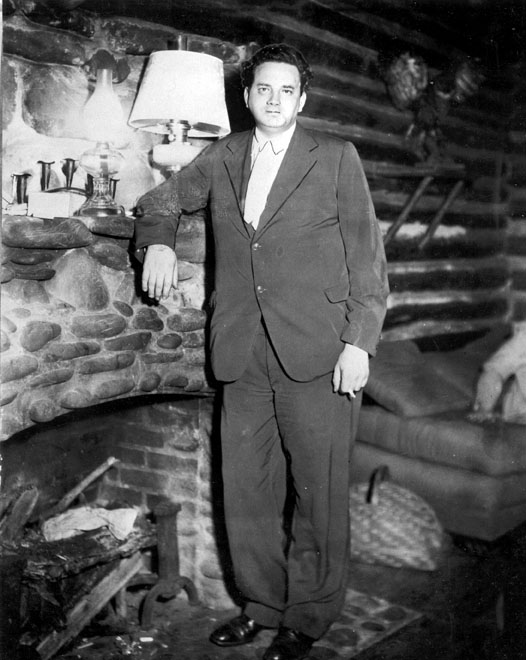In the spring of 1937, writer Thomas Wolfe returned to Asheville. He had avoided his hometown over the previous eight years, following the 1929 publication of his novel, Look Homeward, Angel. At the time of its debut, the book’s thinly disguised setting and characters did not sit well with many local residents.
But by 1937, time had eased old tensions. On May 3, The Asheville Citizen informed readers of the writer’s visit: “The author said he was glad to be back, that many times during his travels in Europe and his residence in New York he had been homesick for Asheville, its people and its surrounding mountains.”
Wolfe’s initial visit, however, was brief. He was back in New York by mid-May, with plans for a second, longer stay later that summer.
On June 26, 1937, Wolfe wrote his older brother Fred about his imminent return. The cabin he planned to rent in Oteen was nearly ready for him, he explained. And though plans were going accordingly, Wolfe expressed concerns about his upcoming summer retreat in the mountains.
First and foremost, he told his brother, he wasn’t sure how he would go about transporting his half-million-word manuscript. “I hate to take the chance of letting it go out of my sight,” he wrote.
Then there was the issue of the cabin’s proximity to Asheville. Wolfe feared it would tempt many in town to show up unannounced, disrupting his writing process. “Most people don’t realize that writing is not only hard work, but that a writer, when he works, works several times as hard as the average business man,” Wolfe declared in the missive.
He continued:
“My experience has been that most business and professional people do not work very hard, not nearly as hard as they think they do. This is particularly true of a town like Asheville. … I noticed this again when I was home in May: a lot of the boys I know who are now lawyers would invite me up to their offices in the Jackson Building and we would spend an entire afternoon talking, and no one would come in.”
Despite his consternation and critique, Wolfe arrived in Oteen in early July. Soon thereafter, in a letter to fellow writer and friend Hamilton Basso, Wolfe reported:
“I have encountered certain learned, local psychologists who hint darkly that I will find it impossible to work here: one even said that I would find these surroundings ‘allergic.’ … All of which I hold to be ridiculous: work, as you yourself know, is a desperate necessity; and if the need is desperate enough nothing will stop us — not even our own lazy bones or natural indolence of which I have so much more than a fair share — not even, by God, allergic conditions.”
The statement proved prophetic. In an August correspondence with his agent, Elizabeth Nowell, Wolfe claimed he wrote between 60-80,000 words since his return.
But such productivity did not stop Wolfe from grumbling to Nowell about the claustrophobic nature of his living situation. “I know so many people here and the place is really very small,” he wrote. “People know everything you do, even before you do it[.]”
Such scrutiny, however, did not run Wolfe off early. He remained in the area until September.
That November, while back in New York, he again wrote his brother Fred, bewailing the recent visit. Nothing about Asheville had changed, he complained. “I went home a very tired man. … And when I left home I was as near to a breakdown as I have ever been,” he proclaimed. “So I guess that’s the end of me in Asheville[.]”
Sadly, the following year would be Wolfe’s final. He died Sept. 15, 1938, a result of tubercular meningitis.
Years later, in 1971, Max Whitson, the cabin’s owner, revisited Wolfe’s time at his property. The piece, published in the Oct. 3, Sunday edition of the Asheville Citizen-Times, coincided with Wolfe’s birthday.
Though Whitson notes that Wolfe had a “burning desire to get on with his work,” the property owner, who spent many days that summer with the writer, was skeptical about the true motive behind Wolfe’s visit.
“I don’t think Tom came home that summer to do a lot of writing,” Whitson reveals near the latter half of the article. “Deep down he was a little home sick but it is my guess he came to collect fresh material for a new novel. A novel of Altamont up-to-date. A novel he never had time to write.”
Editor’s note: Peculiarities of spelling and punctuation are preserved from the original texts.




Poor Thomas Wolfe.. Nothing has changed since his time except the names of the corrupt.
I so empathize as my experience of Asheville validates his assertions about this town. They always run out of town truth tellers.
Bless Wolfe.. Without his work, I’d have never understood the clueless class at the top.
They have not changed since Rome.
The elite are a criminal class who employ lawyers to hide their crimes.
While I’ve been urged to write a book about this, because of Wolfe I know what would happen.
I’ll not be run out of the place my Cherokee ancestors were..
Just for the satisfaction of exposing the corruption in this evil town